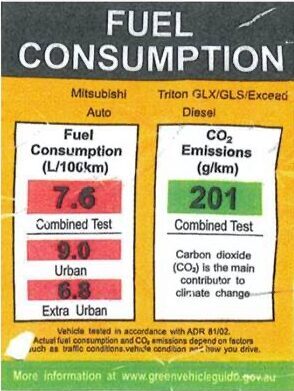In December 2023, the High Court found in favour of Mitsubishi in its long-running fuel consumption label litigation.
Background
Mitsubishi is required to stick a label to the windscreen of its Triton model, setting out the vehicle’s fuel consumption. The content and form of the label is strictly regulated by the Motor Vehicle Standards Act 1989 (Cth) (MVSA) and Australian Design Rule 81/02 (ADR 81/02).
In 2017, Mr Begovic purchased a new Mitsubishi Triton. The label disclosed a fuel consumption level of 7.6L per 100km, which had been determined by mandatory standardised fuel consumption testing. However, soon after purchase, Mr Begovic found that the Triton’s fuel consumption was significantly higher than the label.
He arranged for testing of the vehicle’s fuel consumption, which determined that the consumption was up to 26.6% higher than the 7.6L per 100km figure.
When he couldn’t resolve his complaint with the dealer or Mitsubishi, he filed a complaint with the Victorian Civil and Administrative Tribunal (VCAT).

Litigation journey
Mr. Begovic was initially successful. In 2019, VCAT ordered the dealer to refund him the vehicle’s purchase price on the basis that it was not of “acceptable quality”. VCAT also found that Mitsubishi had engaged in misleading and deceptive conduct, in breach of the Australian Consumer Law (ACL). Mitsubishi appealed VCAT’s decision to the Supreme Court of Victoria and then to the Court of Appeal but was unsuccessful in both appeals.
High Court decision
Mitsubishi then appealed to the High Court. The dilemma to be resolved by the High Court was whether Mitsubishi, in complying with mandatory vehicle standards and affixing the compulsory label, had engaged in misleading and deceptive conduct.
On 13 December 2023, the High Court unanimously allowed the appeal and dismissed Mr Begovic’s initial application to VCAT. The High Court held that it was necessary to construe the prohibition against misleading and deceptive conduct in the ACL consistently with the MVSA and ADR81/02. The High Court found that the obligation on Mitsubishi to affix the fuel consumption label was inconsistent with its obligation not to mislead or deceive consumers as the content of the label was unavoidably misleading. The Court said that in the event of legislative inconsistency the more specific provision, being the requirement to display the fuel consumption label, may override the general provision, being the prohibition on misleading conduct. Therefore, the obligation to attach the label to the vehicle relieved Mitsubishi of its obligation to not misled or deceive via the legally mandated content of that label.
“[I]n the event of apparent inconsistency of statutory requirements relating to the same subject matter … and enacted by the same legislature, the general provision may need to be subordinated to the specific provision in order to alleviate the apparent conflict.” (High Court)
In circumstances where Mitsubishi was bound to apply the fuel consumption label on the Triton, the form and content of which were dictated by legislation, Mitsubishi did not, by application of the label, breach s 18 of the ACL.
Implications
The High Court’s decision provides a decisive precedent that may alleviate the concerns of vehicle manufacturers and dealers, offering clarity on the balance between legislative compliance and OEMs’ obligations to consumers. This ruling may establish a safeguard for companies adhering to mandated regulations where compliance may lead to an inevitable breach of another law.


